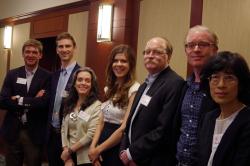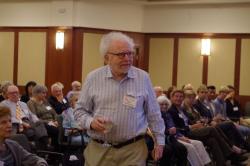Connecticut Academy of Arts and Sciences
Minutes of the CAAS 1445th Meeting
September 16, 2015
Whitney Center, Hamden, CT
Minutes of CAAS Meeting 1445: Walt Whitman’s Democracy
Alan Trachtenberg, Professor Emeritus, Yale University
The President conducted the Annual Business meeting from 4-4:45PM
The Regular Meeting opened with the introduction of the following new members. Joanne B. Freeman, PhD, Tyler Griffith, PhD, David Smith, MD
The First CAAS Graduate Student Fellows were introduced by John (Jay) Emerson, VP for Yale
Elisabeth Becker (Sociology)
Zlatko Minev (Applied Physics)

Professor Tignor then introduced Professor Trachtenberg as one of the world’s great scholars on Walt Whitman during his career in English and American Studies.

The minutes of his talk are as follows.
Trachtenberg gave an approximately 45 minute talk on Walt Whitman’s Democracy.
A vivid and yet most elusive presence among American writers, he remains the least understood. A large reason for his apparent elusiveness lies in what is called his politics: his resolute attachment to “democracy.” The ordinary senses of the word politics don’t cover his notion of democracy, a word Whitman equates more with religion and morality than with representative government
The inquiry I want to propose within the modest limits of this little talk is not addressed so much to his actual politics, his particular views and positions toward the issues of his day, but what he means by politics, by democracy and how these meanings figure in what makes Whitman so continually alive for us: His power to magnetize, to transform.
He is not a figure to say he had a certain politics, who supported this party or candidate.
More damage comes from ignoring or devaluing his politics than from misunderstanding it. He is decidedly our greatest political poet, a voice still relevant to our political culture, one whose bequest belongs to democracy or nothing at all.
Whitman the prophet of democracy, Santayan discounts as pernicious and destructive to his talent. Thus, Whiteman was made out to fail most precisely where he claimed most, in his own ultimate test of the word Democracy.
Whitman stood firm against slavery. But entered into a profound melancholy in 1855-60, changing mood. Was this because of slavery? Slavery should be abolished to free the true citizens, the white people.
Whitman, the theorist of democracy does not so easily disappear. The demonic Whitman was read and absorbed by the angry, bewildered unionist and egalitarians in the 1890s, all took courage in his words.
The rough Whitman remains a heroic figure though probably just as delicate as his critics thought.
Questions and Answers
Question: No nation can rise above itself in regard to race relationship.
Answer:
Whitman was a great optimist. Suggesting that no nation can rise above itself, depends on individual relations. Not about the flag. Must see equality as based on relations between people.
Question: Bloom says Whitman was the classic auto-eroticist. Virility of Whitman’s images. Strength of American in that frame. Was he Aspergers?
Answer:
Whitman is a grand mystery. No certainty regarding his sexuality or personhood. Most is in his prose, not his poetry. Profound sexual quandary in this era of America. e.g., the whaler, the frontier wife, the children.
Question: I think Quandary is a key word.
Answer:
Bloom was all over quandary. Bloom was not as interested in equality as Whitman although Whitman has doubts about issues such as majority rule. Many obnoxious things about Whitman.
Question: Bill Clinton offered Leaves of Grass to Monika Lewinsky
No Comment
Question: Found book in bookcase used when studied Whitman. John Lovell expert on Whitman. Got through sexual imagery. Expressive reader. Does this mean we can get through after re-reading.
Answer:
Many people have a second experience. Good part is negative as well as positive. Whitman is enthralling. Speaker was enthralled as a youth. Walking in Philadelphia Park where Whitman walked was spell-binding. The polarity is a healthy sign. Not everything in Whitman is to be believed.
Question:
As one who loved Whitman and taught him.
If I contradict myself, I contradict myself. Helps to explain contradictions in America.
Answer:
could not say it any better.
Minutes by Monica Aspianto, Recording Secretary